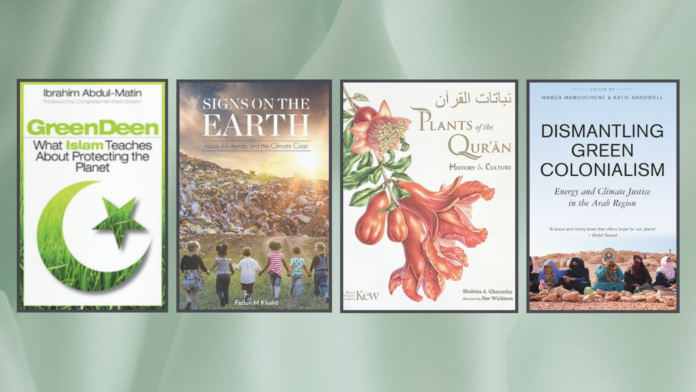The Muslim Climate Watch team gathered this list of innovative and insightful books on the intersectionality of climate and Islam. This collection can be used to educate, inform, and inspire Muslim and Non-Muslims alike who are interested in the topic.
Here are the 10 must-reads we’ve picked:
- Green Deen: What Islam Teaches About Protecting the Planet

Green Deen: What Islam Teaches About Protecting the Planet by Ibrahim Abdul-Matin is a groundbreaking exploration of the intrinsic connection between Islamic teachings and environmental stewardship. Abdul-Matin draws on scripture, research, and interviews with Muslim Americans to illuminate the profound ecological ethos embedded within Islam. At the heart of the book lies the concept that the Earth itself is a sanctuary, echoing the Prophet Muhammad’s declaration that “the Earth is a mosque.” Abdul-Matin translates this spiritual reverence into practical action, advocating for a “Green Deen” encompassing waste reduction, energy conservation, water preservation, and sustainable food practices.
Muslim Climate Watch considers this book among the 10 must-reads on climate, environment, and Islam, recognizing its significant contribution to the discourse on environmental activism within the Muslim community. Explore the book further here.
- Signs on the Earth: Islam, Modernity, and the Climate Crisis
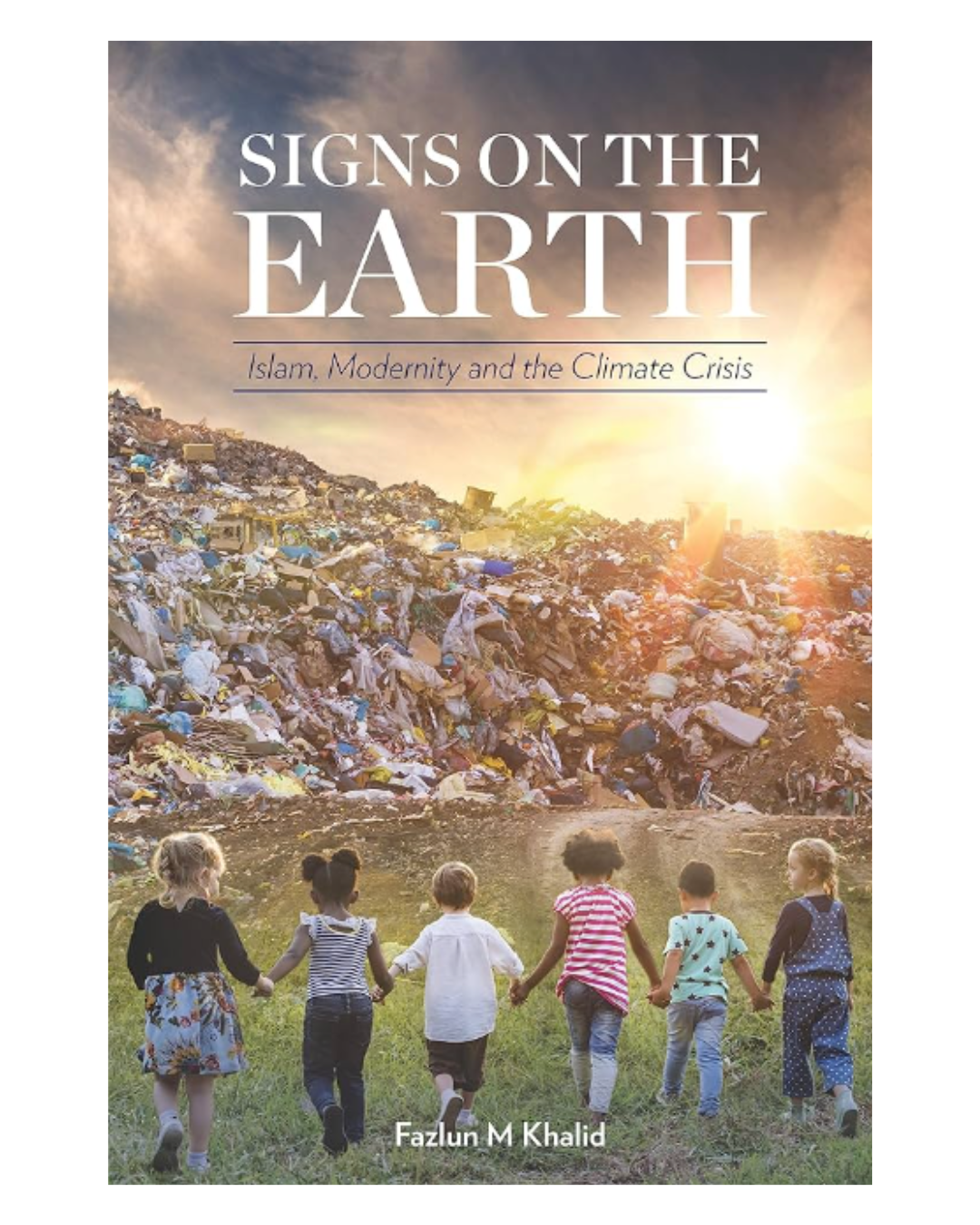
Signs on the Earth: Islam, Modernity, and the Climate Crisis is a seminal work by Fazlun M Khalid, exploring the intersection of environmentalism and Islam, offering both practical insights and theoretical reflections. Focusing on historical context and future challenges, including the need to integrate ecological principles into Islamic legal traditions, Khalid urges a re-evaluation of modernity, consumerism, and industrialization. The book aims to inspire environmental change within the global Muslim community by reconnecting humanity with creation within the divine order.
This book is considered a must-read for its potential to transform attitudes and catalyze action among one billion Muslims worldwide. Get a copy here.
- Plants of the Qur’ān, History and Culture

Plants of the Qur’ān, History and Culture offers a captivating exploration of the botanical world mentioned in the Qur’ān. With lush illustrations by Sue Wickison and insights from botanist Shahina Ghazanfar, it unveils the historical and cultural significance of thirty Quranic plants, from pomegranates to ginger. The book delves into their roles as food, medicine, and symbols, shedding light on their context within Islamic scripture.
The unique blend of art, science, and cultural exploration enriches our understanding of nature’s importance within religious contexts. Explore the book further here.
- Dismantling Green Colonialism: Energy and Climate Justice in the Arab Region
Dismantling Green Colonialism: Energy and Climate Justice in the Arab Region confronts Eurocentrism and advocates for a class-conscious approach to climate justice crucial for survival. Co-authors Hamza Hamouchene and Katie Sandwell critique the COP process for enabling greenwashing by ruling classes, undermining real progress. The Arab region, a focus of world politics with significant fossil fuel reserves, faces severe climate impacts exacerbated by (neo)colonial agendas. Writers in this book spotlight the importance of fighting for a just energy transition, exposing policies protecting political elites and multinational corporations.
This work includes an incisive analysis of climate injustices and a call to challenge entrenched power structures hindering meaningful action in the Arab region. Read more here.
- Deserts Are Not Empty
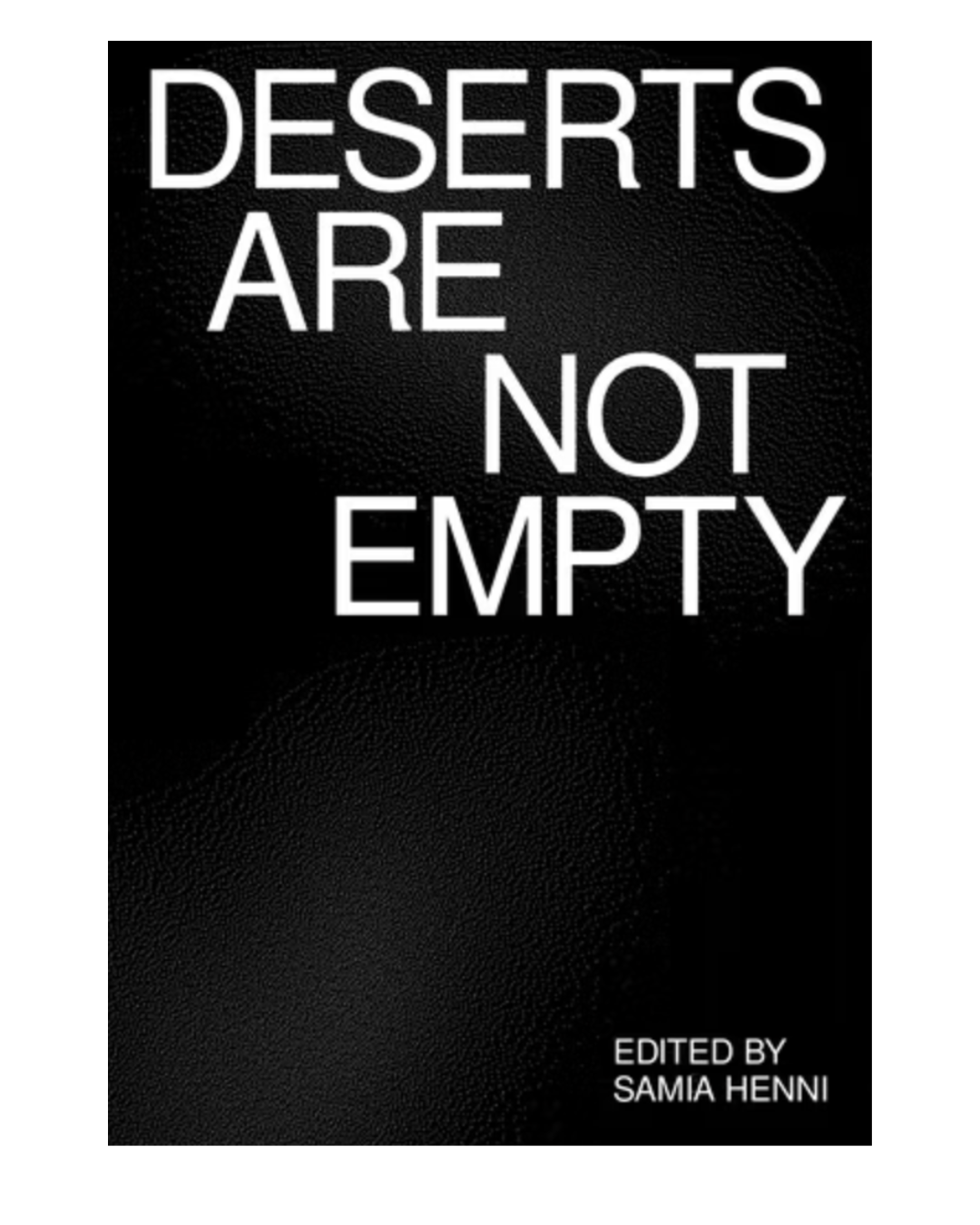
Deserts Are Not Empty by Samia Henni challenges colonial narratives portraying arid lands as “empty” spaces ripe for exploitation. This book remaps representations, histories, and stories of deserts, highlighting their undeniable human and nonhuman presence. Through poems, conversations, and essays by scholars and professionals, it questions the roots and ramifications of the “regime of emptiness” ingrained in colonial imaginaries.
Its decolonial framework urges readers to unsettle and unlearn prevailing perceptions of deserts, fostering new ways of seeing, thinking, and imagining these vital landscapes beyond extractive politics.
- The Land in Our Bones

The Land in Our Bones by Layla K. Feghali is a profound exploration of Lebanon and Cana’an’s land-based medicines, inviting readers to reconnect with their roots and deepen relationships with their lands. Feghali, a Lebanese ethnobotanist and cultural worker, intertwines cultural survival with earth-based knowledge, offering a layered history of healing plants and their significance in Cana’an and the Crossroads. Through the praxis of “Plantcestral Re-Membrance”, Feghali examines how ancestral healing practices connect land and kin, providing a lifeline for regenerative healing amidst colonization and displacement.
The book is a powerful call towards belonging, healing and freedom through tending the land within one’s own bones. By reclaiming ancestral wisdom and fostering ecological stewardship, Feghali offers a pathway towards reconnection with the land and liberation from colonial legacies.
- The Environment and Ecology in Islamic Art and Culture
The Environment and Ecology in Islamic Art and Culture explores the intersection of Islamic culture and climate change, highlighting the profound ecological awareness embedded in Islamic art and architecture. Authored by scholars and critics, the book highlights optimistic, sustainable, and innovative responses to environmental destruction, showcasing the ingenuity of artists and builders. By showcasing the creative approaches adopted within Islamic art and architecture, the book inspires a deeper understanding of environmental stewardship rooted in Islamic traditions and principles.
Muslim Climate Watch recognizes this book for its comprehensive exploration of how Islamic culture intersects with climate change, offering valuable insights into historical and contemporary perspectives.
- Muslim Environmentalisms: Religious and Social Foundations
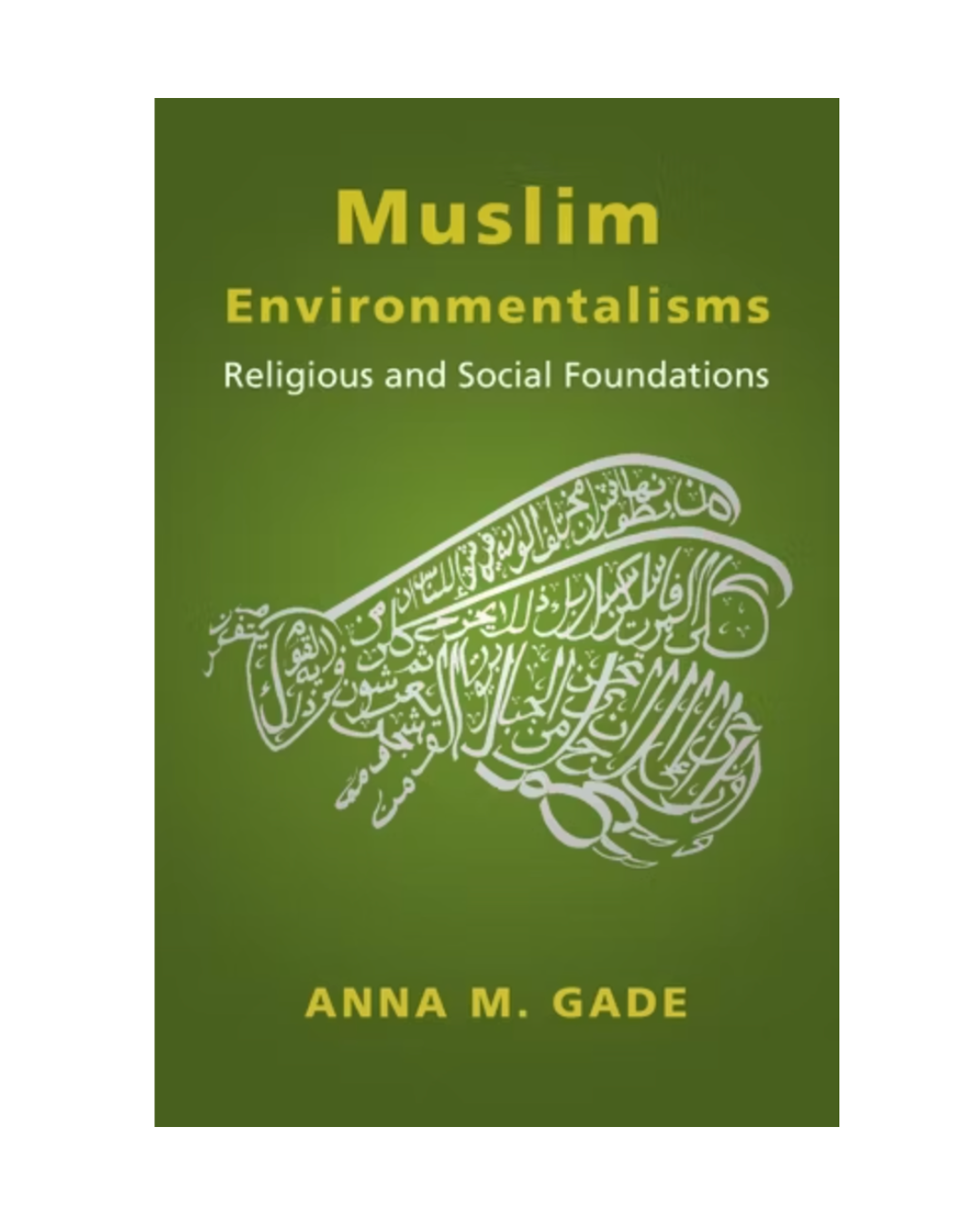
Anna M. Gade’s Muslim Environmentalisms: Religious and Social Foundations delves into Islamic perspectives on environmentalism, bridging textual and ethnographic studies to explore the religious and cultural roots of Muslim commitments to the earth. Through a multidisciplinary lens, Gade examines how diverse Muslim communities address ecological concerns, drawing on scripture, jurisprudence, science, art, and social engagement. Case studies from Indonesia and Southeast Asia illustrate disaster management, educational initiatives, conservation projects, and religious rituals, revealing Islam’s ethical approach to environmental stewardship.
It is a groundbreaking examination of how Islamic traditions shape environmental discourse, offering fresh insights that transcend conventional frameworks. Gade’s work challenges biases in religious studies and environmental humanities, advocating for a more inclusive and global understanding of environmental issues through the incorporation of Muslim perspectives.
- Climate Optimism: Celebrating Systemic Change Around the World

Climate Optimism: Celebrating Systemic Change Around the World by Zahra Biabani celebrates systemic change worldwide in environmental sustainability. Biabani, a climate activist, emphasizes hope and action, urging readers to stay optimistic amidst the climate crisis. Through a comprehensive review of promising climate solutions and interviews with activists, the book offers practical advice to change attitudes and implement nature-based solutions.
Its uplifting perspective highlights positive environmental trends and inspires readers to contribute to planetary protection. Biabani’s focus on climate hope and optimism aligns with the mission to foster positive change within the global Muslim community.
- The Last Generation (Generasi Terakhir)
The Last Generation (Generasi Terakhir) by Dr. Fachruddin M. Mangunjaya offers an Islamic perspective on environmentalism and climate change, emphasizing the roles of Muslims in addressing global climate challenges. Originally published in Bahasa Indonesia, the book is now accessible to a wider audience through translations into Arabic and English made by Ummah for Earth Alliance. The Last Generation blends practical environmental knowledge with Islamic scientific theory, addressing themes of harmony and human responsibility. Grounded in Qur’anic teachings, it advocates for stewardship of the Earth and offers guidelines for combating the climate crisis.
Muslim Climate Watch recognizes the significance of this book in integrating Islamic values with environmental discourse, making it one of the 10 best reads on climate, environment, and Islam.

